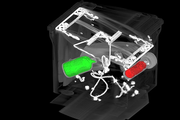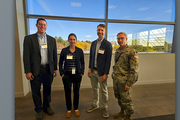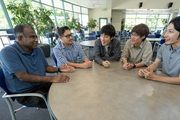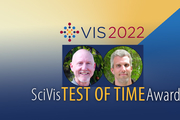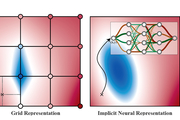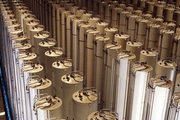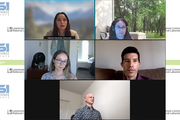Did you know we have a monthly newsletter? View past volumes and subscribe.
Welcome new DSI team members
April 2, 2024 -
When Data Science Institute (DSI) director Brian Giera and deputy director Cindy Gonzales began planning activities for fiscal year 2024 and beyond, they immediately realized that LLNL’s growth in data science and artificial intelligence (AI)/machine learning (ML) research requires corresponding growth in the DSI’s efforts. “Our field is booming,” Giera states. “The Lab has a stake in the...
For better CT images, new deep learning tool helps fill in the blanks
Nov. 17, 2023 -
At a hospital, an airport, or even an assembly line, computed tomography (CT) allows us to investigate the otherwise inaccessible interiors of objects without laying a finger on them. To perform CT, x-rays first shine through an object, interacting with the different materials and structures inside. Then, the x-rays emerge on the other side, casting a projection of their interactions onto a...
Lab partners with new Space Force Lab
Nov. 14, 2023 -
LLNL subject matter experts have been selected by the U.S. Space Force to help stand up its newest Tools, Applications, and Processing (TAP) laboratory dedicated to advancing military space domain awareness (SDA). The Livermore team attended the October 26 kickoff in Colorado Springs of the SDA TAP lab’s Project Apollo technology accelerator, designed with an open framework to support and...
Data Science Summer Institute hosts student interns from Japan
Oct. 13, 2023 -
The Data Science Summer Institute (DSSI) hosted summer student interns from Japan on-site for the first time, where the students worked with Lab mentors on real-world projects in AI-assisted bio-surveillance and automated 3D printing. From June to September, the three students—Raiki Yoshimura, Shinnosuke Sawano and Taisei Saida—lived in rental apartments near the Lab and worked at the Lab on...
High-performance computing, AI and cognitive simulation helped LLNL conquer fusion ignition
June 21, 2023 -
For hundreds of LLNL scientists on the design, experimental, and modeling and simulation teams behind inertial confinement fusion (ICF) experiments at the National Ignition Facility, the results of the now-famous Dec. 5, 2022, ignition shot didn’t come as a complete surprise. The “crystal ball” that gave them increased pre-shot confidence in a breakthrough involved a combination of detailed...
Celebrating the DSI’s first five years
May 18, 2023 -
View the LLNL Flickr album Data Science Institute Turns Five.
Data science—a field combining technical disciplines such as computer science, statistics, mathematics, software development, domain science, and more—has become a crucial part of how LLNL carries out its mission. Since the DSI’s founding in 2018, the Lab has seen tremendous growth in its data science community and has invested...
Patent applies machine learning to industrial control systems
May 8, 2023 -
An industrial control system (ICS) is an automated network of devices that make up a complex industrial process. For example, a large-scale electrical grid may contain thousands of instruments, sensors, and controls that transfer and distribute power, along with computing systems that capture data transmitted across these devices. Monitoring the ICS network for new device connections, device...
Computing codes, simulations helped make ignition possible
April 6, 2023 -
Harkening back to the genesis of LLNL’s inertial confinement fusion (ICF) program, codes have played an essential role in simulating the complex physical processes that take place in an ICF target and the facets of each experiment that must be nearly perfect. Many of these processes are too complicated, expensive, or even impossible to predict through experiments alone. With only a few...
From plasma to digital twins
March 13, 2023 -
LLNL's Nondestructive Evaluation (NDE) group has an array of techniques at its disposal for inspecting objects’ interiors without disturbing them: computed tomography, optical laser interferometry, and ultrasound, for example, can be used alone or in combination to gauge whether a component’s physical and material properties fall within allowed tolerances. In one project, the team of NDE...
Supercomputing’s critical role in the fusion ignition breakthrough
Dec. 21, 2022 -
On December 5th, the research team at LLNL's National Ignition Facility (NIF) achieved a historic win in energy science: for the first time ever, more energy was produced by an artificial fusion reaction than was consumed—3.15 megajoules produced versus 2.05 megajoules in laser energy to cause the reaction. High-performance computing was key to this breakthrough (called ignition), and HPCwire...
National Ignition Facility achieves fusion ignition
Dec. 13, 2022 -
The U.S. Department of Energy (DOE) and DOE’s National Nuclear Security Administration (NNSA) today announced the achievement of fusion ignition at LLNL—a major scientific breakthrough decades in the making that will pave the way for advancements in national defense and the future of clean power. On Dec. 5, a team at LLNL’s National Ignition Facility (NIF) conducted the first controlled...
Papers win Test of Time awards at 2022 IEEE VIS conference
Oct. 31, 2022 -
Two LLNL-led teams received SciVis Test of Time awards at the 2022 IEEE VIS conference on Oct. 18, for papers that have achieved lasting relevancy in the field of scientific visualization. Published in 2008, an LLNL-led paper that—for the first time—allowed Digital Morse Theory to be applied to large scale and three-dimensional data, won the 14-year Test of Time award for making a lasting...
Project co-led at LLNL looks to improve visualization of largescale datasets
Oct. 27, 2022 -
LLNL researchers are starting work on a three-year project aimed at improving methods for visual analysis of large heterogeneous data sets as part of a recent Department of Energy funding opportunity. The joint project, entitled “Neural Field Processing for Visual Analysis,” will be led at LLNL by co-principal investigator (PI) Andrew Gillette. Gillette is joined by lead PI Matthew Berger at...
Scientific discovery for stockpile stewardship
Sept. 27, 2022 -
Among the significant scientific discoveries that have helped ensure the reliability of the nation’s nuclear stockpile is the advancement of cognitive simulation. In cognitive simulation, researchers are developing AI/ML algorithms and software to retrain part of this model on the experimental data itself. The result is a model that “knows the best of both worlds,” says Brian Spears, a...
LLNL to cooperate with University of Utah's one oneAPI Center of Excellence
Sept. 21, 2022 -
The University of Utah has announced the creation of a new oneAPI Center of Excellence focused on developing portable, scalable and performant data compression techniques. The oneAPI Center will be headed out of the University of Utah’s Center for Extreme Data Management Analysis and Visualization (CEDMAV) and will involve the cooperation of LLNL’s Center for Applied Scientific Computing. It...
S&TR cover story: The ACES in our hand
Sept. 20, 2022 -
Uranium enrichment is central to providing fuel to nuclear reactors, even those intended only for power generation. With minor modifications, however, this process can be altered to yield highly enriched uranium for use in nuclear weapons. The world’s need for nuclear fuel coexists with an ever-present danger—that a nonnuclear weapons nation-state possessing enrichment technology could...
Lab researchers win top award for machine learning-based approach to ICF experiments
Aug. 4, 2022 -
The IEEE Nuclear and Plasma Sciences Society (NPSS) announced an LLNL team as the winner of its 2022 Transactions on Plasma Science Best Paper Award for their work applying machine learning to inertial confinement fusion (ICF) experiments. In the paper, lead author Kelli Humbird and co-authors propose a novel technique for calibrating ICF experiments by combining machine learning with...
CASC team wins best paper at visualization symposium
May 25, 2022 -
A research team from LLNL’s Center for Applied Scientific Computing won Best Paper at the 15th IEEE Pacific Visualization Symposium (PacificVis), which was held virtually on April 11–14. Computer scientists Harsh Bhatia, Peer-Timo Bremer, and Peter Lindstrom collaborated with University of Utah colleagues Duong Hoang, Nate Morrical, and Valerio Pascucci on “AMM: Adaptive Multilinear Meshes.”...
Visualization software stands the test of time
Sept. 13, 2021 -
In the decades since LLNL’s founding, the technology used in pursuit of the Laboratory’s national security mission has changed over time. For example, studying scientific phenomena and predicting their behaviors require increasingly robust, high-resolution simulations. These crucial tasks compound the demands on high-performance computing hardware and software, which must continually be...
Former interns share insights during career panel
Aug. 19, 2021 -
The DSI’s new career panel series continued on August 10 with a session featuring former LLNL interns who converted to full-time employment at the Lab. Inspired by the annual Women in Data Science conference, the panel session was open to all LLNL staff and students. Moderator Mary Silva was joined by panelists from the Computing and Engineering Directorates: Brian Bartoldson, Jose Cadena...


